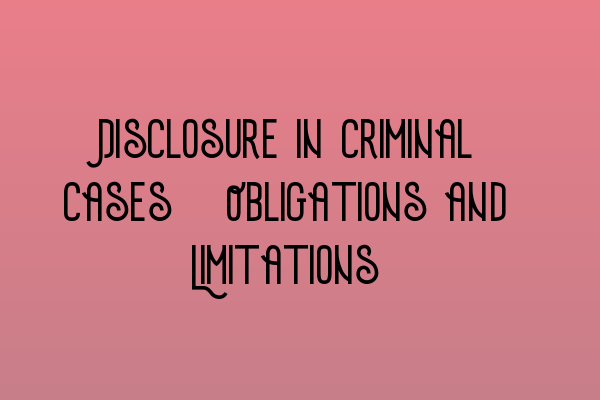Disclosure in Criminal Cases: Obligations and Limitations
When it comes to criminal cases, one of the key elements that can significantly impact the outcome is the disclosure of evidence. Disclosure refers to the obligation of the prosecution to provide the defense with all relevant evidence in their possession. It is crucial to ensure a fair trial and protect the rights of the accused. In this article, we will explore the obligations and limitations surrounding disclosure in criminal cases.
Why is Disclosure Important?
Disclosure plays a fundamental role in the criminal justice system, as it allows the defense to prepare their case adequately and challenge the evidence presented by the prosecution. It ensures a level playing field and guards against wrongful convictions. By disclosing all relevant evidence, the prosecution helps maintain the integrity of the legal process.
Obligations of the Prosecution
The prosecution has a legal duty to disclose all evidence that may assist the defense or undermine their case. This includes both evidence that supports the defense’s case as well as evidence that may damage the prosecution’s case. The obligation to disclose extends to both incriminating and exculpatory evidence and covers all types of evidence, including documents, witness statements, forensic reports, and expert opinions.
The prosecution must disclose evidence at the earliest opportunity and in a timely manner to facilitate effective preparation by the defense. It is not sufficient to provide disclosure shortly before the trial starts, as it may hinder the defense’s ability to challenge the evidence or conduct further investigations.
Limitations on Disclosure
While disclosure is an essential aspect of the criminal justice system, there are certain limitations that may arise. These limitations are primarily in place to protect the safety and privacy of individuals involved in the case, as well as to prevent harm to national security.
One such limitation is Public Interest Immunity (PII), which allows the prosecution to withhold evidence if its disclosure would pose a risk to national security or harm the public interest. However, the decision to claim PII cannot be taken lightly and must be authorized by the court after careful consideration.
Another limitation is legal professional privilege, which protects certain confidential communications between a lawyer and their client from being disclosed. This privilege encourages open and honest communication between lawyers and clients and enables clients to seek legal advice without fear of it being used against them in court.
The Consequences of Non-Disclosure
Failure to comply with disclosure obligations can have serious consequences for the prosecution. The court may consider such non-disclosure as a breach of the defendant’s right to a fair trial and may result in the exclusion of evidence or even the termination of the proceedings.
Conclusion: The Importance of Disclosure
Disclosure is a crucial aspect of criminal cases, ensuring a fair trial and safeguarding the rights of the accused. By providing the defense with all relevant evidence, the prosecution allows for the effective preparation of the defense case and reduces the risk of wrongful convictions. However, disclosure is not without its limitations, as certain considerations must be taken into account to protect the safety and privacy of individuals and the interests of national security. It is essential for all parties involved in criminal cases to understand their obligations and limitations when it comes to disclosure.
For more information related to criminal law and legal practice, you may find the following articles helpful:
- Legal Representation for Delaware LLCs in the UK: Expert Advice
- Ensuring Ethical Business Practices: Delaware’s Code of Conduct
- Legal Challenges for UK Businesses in the U.S.: Strategies for Overcoming Hurdles
- Legal Challenges for UK Businesses in the U.S.: Strategies for Overcoming Hurdles
- SQE Exam Prep: Essential Study Materials for Aspiring Solicitors
